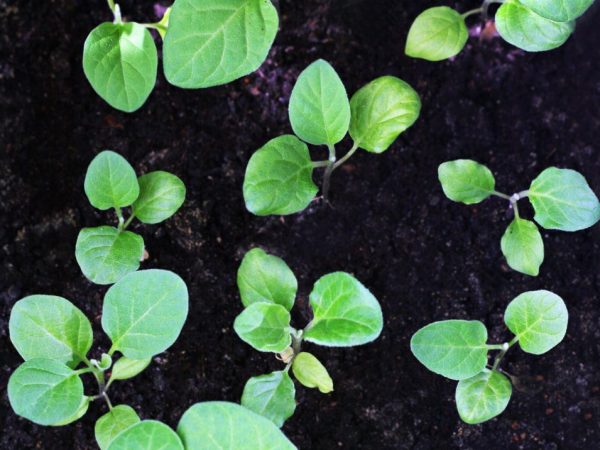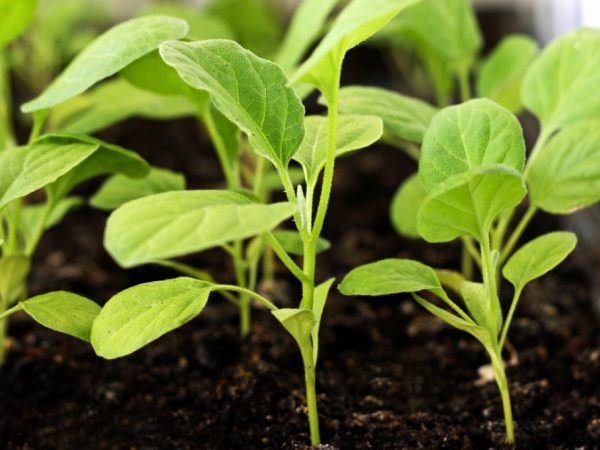Poor growth of eggplant seedlings
Eggplant is a capricious culture. Eggplant seedlings grow poorly for many reasons: poor feeding, improper soil or microclimate.

Poor growth of eggplant seedlings
Causes of poor growth
A healthy plant is small but sturdy and has a massive green leafy mass. If it is thin, dry and sluggish, problems should be looked for in the organization of fertilizing, in the soil or temperature regime.
Poor growth of young solanaceous bushes can also be a consequence of diseases. Without proper treatment, the plant will die.
Other causes of poor eggplant growth:
- excessive watering;
- damage to the roots;
- lack of light.
One of the common problems for which the grown plants develop slowly is also the unsuitable volume of the container. You need to carefully pull the plant out of the pot or glass and examine its roots. If they are brown, the culture does not have enough space and should be transplanted.
What to do with seedlings
The birthplace of culture is India, with its inherent warm and humid climate. In temperate climatic latitudes, culture develops slowly and dies without proper care.
If the growth is poor, the eggplant seedlings and the growing area should be looked around for signs that precede growth retardation.
Problems with eggplant seedlings are solved after determining the reasons that led to this phenomenon. It is worth revising all the features of the content of the nightshade culture.
Picking
If, before transplanting into open ground, the culture grew normally, and after that it slowed down in growth, the cause is an incorrect pick. The root system of the culture could be damaged by careless use of garden tools.
This problem can be solved by using means to stimulate root growth. The most popular drug is "Kornevin", it is applied at the root.
Soil and containers
Problems with eggplant seedlings often arise due to problems with the substrate in which they are grown. Solanaceae prefer to grow in light soils. A mixture of garden soil with sand, as well as peat or humus is suitable for them.
The soil should be neutral or slightly alkaline. Increased acidity adversely affects the development of nightshades, slows down their growth and development.
If the roots have become brown or they are visible at the surface of the soil, transplanting into a large container is necessary. When transplanting, it is important not to violate the integrity of the earthen coma.
Organization of watering and fertilization

Excessive watering harms plants
These representatives of the nightshade love moisture, but suffer from excess of it. When growing in pots, use containers with drainage holes.
Watering features:
- water when the top layer of the soil dries up;
- only settled or melt water with a temperature of 22-25 ° C is used;
- so that the roots breathe, the soil is gently loosened between waterings.
There are also requirements for feeding. When the first pair of leaves appears on the seedlings, they are fertilized with complex fertilizer.It is important that it contains urea, superphosphate and potassium sulfate.
Content temperature
It is important to create a favorable microclimate. The temperature during the day is 23-25 ° С, and at night - 16-18 ° С.
The location of the pots is also important. If they stand on a windowsill, there is a risk of freezing of the soil in winter. The difference in temperature between the air and the substrate will destroy the plant. Therefore, you will have to hang the window with a cloth or move the containers to another place.
Diseases
The most dangerous disease that prevents the garden culture from developing normally is the black leg. With such a disease, the stem begins to darken and wither. The plant stops growing and slowly dies.
It is difficult to deal with such a disease. It is best to remove infected seedlings so that the disease does not spread to other healthy bushes.
Hardening of seedlings
Problems with growth retardation are solved by organizing proper crop care. But by hardening the plants, you can get healthy and temperature-resistant plants.
This procedure helps to strengthen the immune system, which will be planted in open ground. The culture seedlings kept at home are organized under stress conditions, which are determined by changes in air temperature and humidity.
Hardening rules:
- Favorable time - 7-10 days before planting bushes in open ground.
- If the weather is warm, the pots are taken outside. Cool places in the apartment are also suitable - a loggia or a balcony.
- The time the plants stay cool is increased gradually.
If a greenhouse is installed on the territory of the farm, hardening of nightshades is carried out in it. The transplant is performed when the seedlings reach 20 cm in height and 6-8 leaves appear on them.
Conclusion
With proper care, eggplants will be healthy and strong and produce a good harvest. If they grow slowly, it is necessary to reconsider the quality of irrigation, the moderation of air temperature, illumination, and other factors. By correcting the peculiarities of the maintenance of nightshades, you can normalize the growth of seedlings.


